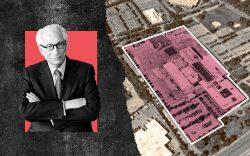 Warehouse developer accused of violating “Long Island First” policy
Warehouse developer accused of violating “Long Island First” policy
Trending
Huntington eyes welcome mat for developers
New zoning would allow new uses for industrial space

Huntington officials are prepared to create more opportunities for developers, but not everyone is on board with the plan of the town’s outgoing supervisor.
The town board is holding public hearings Tuesday on the potential creation of an overlay zoning district along Route 110 in Melville, according to Newsday. The district would allow different uses for industrial properties if builders meet certain requirements.
One of the hearings will discuss allowing multifamily housing, offices, research, entertainment or retail projects on properties zoned for industrial use. Requirements would include connecting to sewers and providing parking.
Read more
 Warehouse developer accused of violating “Long Island First” policy
Warehouse developer accused of violating “Long Island First” policy
 Amazon plans Melville fulfillment center as it expands across LI
Amazon plans Melville fulfillment center as it expands across LI
Other measures being considered include taking away the one-building-per-lot restriction and requiring 20 percent of residential units to be affordable within the zone. Newsday reported that parcels would be prohibited from having frontage on the Long Island Expressway Service Road.
“This ensures that economic development remains a priority for the Town of Huntington and we continue to attract businesses from all parts of the world,” said outgoing Town Supervisor Chad Lupinacci.
The proposed zoning has drawn some objections, though, as has the afternoon hearing schedule, which can exclude people who work during the day.
“While I am dedicated to finding a planning solution to addressing the economic viability concerns raised by property owners in the Route 110 Melville corridor, as well as those expressed by the corridor’s surrounding residential communities, I voted against scheduling these public hearings for Melville,” town board member Joan Cergol told Newsday, saying not all of his questions have been answered.
The value of industrial properties across America did not keep up with that of other real estate asset classes as manufacturing jobs moved overseas or were replaced by automation starting in the 1960s. But industrial sites have been the industry’s hottest properties for the past few years, thanks to e-commerce and the push for faster delivery.
It was not immediately clear why Huntington’s industrial sites need new zoning to be economically viable.
A vote on the proposals could take place as soon as the hearings are concluded. The meeting is the final one for Lupinacci as supervisor.
[Newsday] — Holden Walter-Warner




